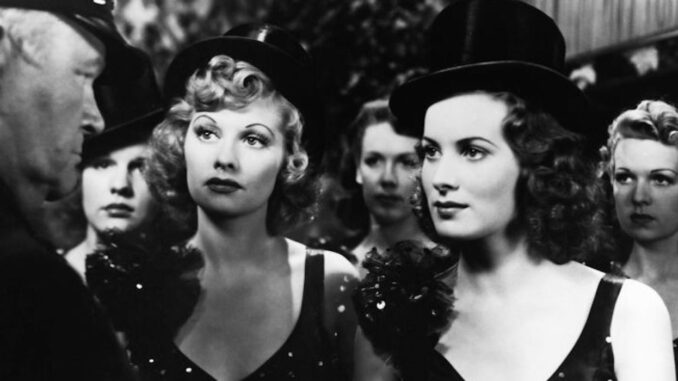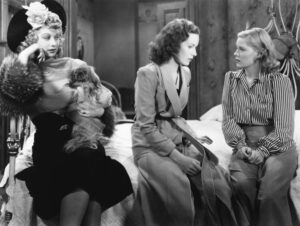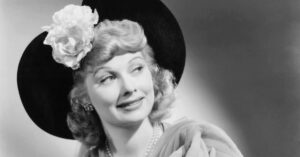
When you think of Lucille Ball, the first thing that likely comes to mind is I Love Lucy—the groundbreaking sitcom that solidified her as a television icon. However, long before she donned the title of America’s favorite funny woman, Lucille was already turning heads in Hollywood. In fact, she delivered a show-stealing performance in a ’40s cult classic that many modern audiences overlook. Let’s dive into the hidden gem of Lucille Ball’s early career and discover how she paved the way for her eventual TV domination.
The Hollywood Star Before TV Fame
Lucille Ball’s rise to fame was no overnight success. She started her career in Hollywood in the early 1930s, appearing in a string of forgettable films. But things took a dramatic turn for her in the 1940s. Before becoming the household name behind I Love Lucy, Lucille starred in a film that showcased her versatility, comedic timing, and undeniable screen presence. That film? The Big Street (1942).
What Is ‘The Big Street’?

The Big Street was a 1942 film that solidified Lucille Ball as more than just a pretty face in Hollywood. Directed by Irving Reis, the movie was adapted from a short story by renowned writer Damon Runyon. This dark romantic drama features Ball in one of her most complex and layered roles—far from the slapstick comedy she later became known for.
Lucille Ball’s Breakout Role
In The Big Street, Lucille played the role of Gloria Lyons, a nightclub singer whose life takes a tragic turn. She was far from the bubbly and ditzy Lucy Ricardo we all know and love. Instead, Gloria was a cold, ruthless, and ultimately tragic character. Ball brought emotional depth and authenticity to this role, proving that she had the chops for serious drama, not just comedy.
A Role That Stole the Spotlight
Even though The Big Street was packed with talent, Lucille Ball undeniably stole the show. Her portrayal of Gloria Lyons was gripping, nuanced, and unforgettable. It was this film that showcased her range as an actress and proved she was capable of more than just the comedic roles she had been typecast into during her early career.
The Impact of ‘The Big Street’ on Lucille Ball’s Career
It was The Big Street that earned Ball respect from Hollywood insiders. Critics praised her performance, and while the movie wasn’t a box office smash, it became a cult favorite in later years. More importantly, the film laid the foundation for her later success, giving her the credibility she needed to push for more creative control in her projects.
How Lucille’s Early Career Led to ‘I Love Lucy’

Lucille’s work in the ’40s—especially her performance in The Big Street—gave her the experience and confidence she needed to break into television. By the time I Love Lucy debuted in 1951, she had honed her skills both in drama and comedy, allowing her to create one of the most iconic characters in TV history.
The Chemistry of Lucille and Co-Star Henry Fonda
The Big Street also paired Lucille with the legendary Henry Fonda, whose star was on the rise at the time. Their on-screen chemistry helped to elevate the film, creating a dynamic tension that left audiences mesmerized. Lucille’s ability to hold her own alongside a heavyweight like Fonda was further proof of her undeniable talent.
A Shift in Public Perception
Before The Big Street, Lucille was primarily seen as a B-movie actress, often cast in smaller, decorative roles. But her performance as Gloria Lyons marked a significant shift in how Hollywood viewed her. She went from being a side character to a leading lady, showing that she could carry a film with both dramatic and emotional weight.
The Comedy Roots in a Dark Role
Despite the serious tone of The Big Street, Ball’s natural comedic timing still shone through in subtle ways. This ability to blend drama with comedy would later become one of her signature traits, making her stand out in I Love Lucy. The film served as a stepping stone for her transition from dramatic films to comedic television, proving she could do it all.
The Cult Classic Status of ‘The Big Street’
While The Big Street might not be as well-known today as some of Lucille Ball’s later works, it has achieved cult classic status among film buffs. Its mix of dark romance and gritty realism, paired with Ball’s magnetic performance, has kept it relevant decades after its release. If you’re a Lucille Ball fan who hasn’t seen it yet, you’re missing out on a pivotal moment in her career.
Lucille Ball’s Pre-Television Legacy
It’s easy to forget that Lucille Ball was a movie star long before she became a TV legend. Films like The Big Street offer a glimpse into her range and versatility as an actress. Her pre-television work laid the groundwork for the comedy empire she would eventually build with I Love Lucy, and it remains an essential part of her legacy.
How ‘The Big Street’ Shaped Her Iconic Career
The experience Lucille gained on sets like The Big Street helped her develop the strong work ethic and sharp comedic instincts that would later define her TV career. She learned how to navigate Hollywood, push for better roles, and ultimately take control of her own destiny—a move that would lead to the creation of Desilu Productions and her status as a TV mogul.
Why ‘The Big Street’ Deserves More Recognition
With all the focus on I Love Lucy, it’s easy to overlook the earlier works that helped shape Lucille Ball’s career. The Big Street deserves more recognition, not only for its gripping storyline but also for the way it showcased a different side of Lucille. It proved that she wasn’t just a comedian—she was a versatile, talented actress capable of handling complex, challenging roles.
Conclusion
Lucille Ball may be best known for her comedic genius on I Love Lucy, but her talent went far beyond the sitcom world. The Big Street stands as a testament to her early acting prowess and her ability to tackle serious roles. It’s a film that not only changed her career trajectory but also hinted at the icon she would later become. For fans of Lucille Ball, revisiting this cult classic is a must—it shows the star’s depth, range, and unrelenting ambition to excel in Hollywood, even before she made history on television.